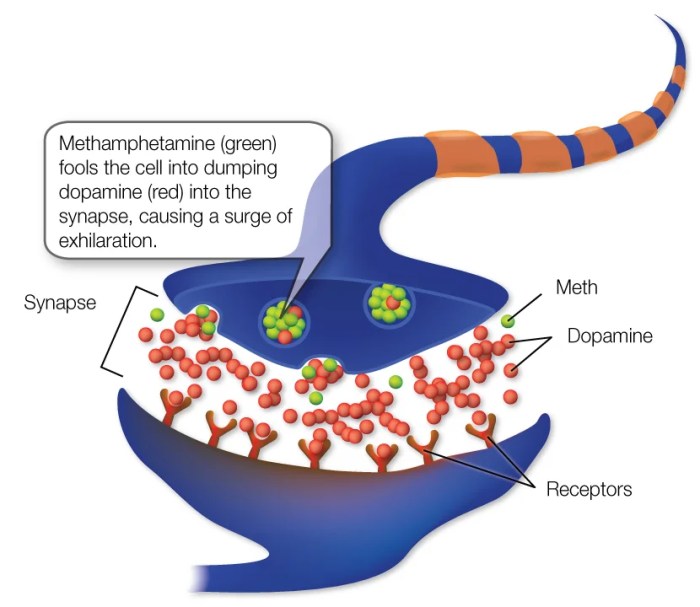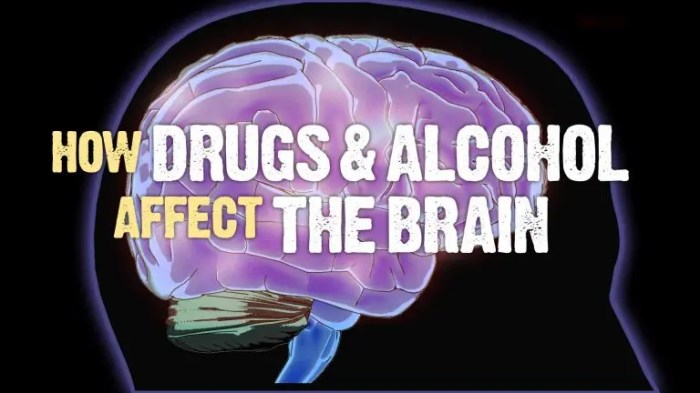How do drugs affect the brain brainly – How do drugs affect the brain? This question delves into the intricate relationship between substances and the human brain, unraveling the profound impact drugs can have on our neurochemistry, behavior, and cognitive abilities.
From the moment a drug enters the body, it embarks on a journey through the bloodstream, reaching the brain and interacting with its delicate circuitry. This interaction can trigger a cascade of neurochemical reactions, altering the levels of neurotransmitters—the chemical messengers that facilitate communication between brain cells.
Introduction to Drug Effects on the Brain
The human brain is a complex organ responsible for controlling various bodily functions, including thoughts, emotions, and behaviors. Drugs are substances that can alter the normal functioning of the brain, leading to changes in perception, mood, and behavior. Understanding how drugs interact with the brain is crucial for comprehending their effects and potential consequences.
Drugs can affect the brain through various mechanisms. Some drugs bind to specific receptors in the brain, altering the transmission of neurotransmitters, which are chemical messengers that facilitate communication between neurons. Other drugs may interfere with the production or reuptake of neurotransmitters, affecting their availability and function.
The specific effects of a drug depend on its chemical structure, the receptors it interacts with, and the dose consumed.
Types of Drugs and Their Effects on the Brain
There are numerous types of drugs, each with its unique effects on the brain. Some common drug categories and their primary effects include:
- Stimulants:These drugs increase alertness, energy levels, and focus. Examples include caffeine, nicotine, and amphetamines.
- Depressants:These drugs slow down brain activity, leading to relaxation, drowsiness, and reduced inhibitions. Examples include alcohol, benzodiazepines, and opioids.
- Hallucinogens:These drugs alter perceptions, thoughts, and emotions, often leading to hallucinations and altered states of consciousness. Examples include LSD, psilocybin, and DMT.
- Cannabinoids:These drugs interact with the endocannabinoid system in the brain, affecting mood, appetite, and pain perception. The primary psychoactive component of cannabis, THC, is an example.
Neurochemical Alterations
Drug use can lead to significant alterations in the brain’s neurochemistry. These alterations affect neurotransmitter levels, which in turn impact brain function and behavior. The changes in neurotransmitter levels can be both short-term and long-term, with potential consequences for the individual’s physical and mental health.
Dopamine
Dopamine is a neurotransmitter associated with pleasure and reward. Drug use can increase dopamine levels, leading to feelings of euphoria and reinforcement. However, chronic drug use can lead to a decrease in dopamine levels, resulting in tolerance, withdrawal symptoms, and a reduced ability to experience pleasure.
Serotonin
Serotonin is a neurotransmitter involved in mood, sleep, and appetite. Drug use can increase serotonin levels, leading to feelings of well-being and relaxation. However, chronic drug use can deplete serotonin levels, resulting in depression, anxiety, and insomnia.
GABA, How do drugs affect the brain brainly
GABA is a neurotransmitter that inhibits neuronal activity. Drug use can increase GABA levels, leading to feelings of relaxation and sedation. However, chronic drug use can reduce GABA levels, resulting in anxiety, seizures, and insomnia.
Long-Term Consequences
The long-term consequences of neurochemical alterations caused by drug use can be severe. These consequences include:
- Addiction
- Cognitive impairment
- Mood disorders
- Anxiety disorders
- Sleep disturbances
- Increased risk of stroke and heart disease
Structural and Functional Brain Changes: How Do Drugs Affect The Brain Brainly

Drug abuse has profound effects on the structure and function of the brain. These changes can lead to a variety of cognitive, emotional, and behavioral problems.
Structural Brain Changes
Neuroimaging studies have shown that drug abuse can lead to structural changes in the brain, including:
- Reduced volume of gray matter in the prefrontal cortex, hippocampus, and amygdala
- Increased volume of white matter in the frontal lobes
- Changes in the shape and size of the ventricles
These structural changes are thought to be caused by a combination of factors, including:
- Neurotoxicity: Drugs of abuse can damage neurons and glial cells, leading to cell death and a reduction in brain volume.
- Inflammation: Drug abuse can trigger inflammation in the brain, which can damage neurons and disrupt brain function.
- Oxidative stress: Drug abuse can increase the production of free radicals in the brain, which can damage cells and DNA.
Functional Brain Impairments
Drug abuse can also lead to functional impairments in the brain, including:
- Impaired cognitive function: Drug abuse can impair attention, memory, and executive function.
- Emotional dysregulation: Drug abuse can lead to emotional instability, irritability, and depression.
- Behavioral problems: Drug abuse can lead to impulsive behavior, aggression, and violence.
These functional impairments are thought to be caused by a combination of factors, including:
- Neurotransmitter imbalances: Drug abuse can disrupt the balance of neurotransmitters in the brain, which can lead to changes in mood, behavior, and cognition.
- Synaptic plasticity: Drug abuse can disrupt synaptic plasticity, which is the ability of synapses to change their strength over time. This can lead to learning and memory impairments.
- Neurogenesis: Drug abuse can inhibit neurogenesis, which is the birth of new neurons. This can lead to a decline in brain function over time.
The structural and functional brain changes associated with drug abuse can have a significant impact on behavior and cognitive abilities. These changes can lead to problems with learning and memory, decision-making, and emotional regulation. They can also increase the risk of developing mental health disorders, such as depression and anxiety.
Behavioral and Cognitive Effects

Drug use can lead to a wide range of behavioral and cognitive effects, including changes in mood, motivation, decision-making, memory, attention, and executive function.
Behavioral effects of drug use can include:
- Increased or decreased activity levels
- Changes in mood, such as euphoria, depression, or anxiety
- Impaired judgment and decision-making
- Increased risk-taking behavior
- Changes in motivation and goal-directed behavior
Cognitive impairments associated with drug abuse can include:
- Memory problems
- Attention deficits
- Impaired executive function, such as planning, problem-solving, and decision-making
Different drugs can have different behavioral and cognitive effects. For example, stimulants like cocaine and methamphetamine can increase activity levels, alertness, and euphoria, while depressants like alcohol and benzodiazepines can decrease activity levels, impair judgment, and cause drowsiness.
Addiction and Dependence
Drug addiction is a chronic, relapsing brain disease that is characterized by compulsive drug seeking and use, despite negative consequences.
The neurobiological mechanisms underlying drug addiction involve complex interactions between brain circuits, neurotransmitters, and genes. Drugs of abuse alter the normal functioning of these circuits, leading to changes in mood, behavior, and cognition. Over time, repeated drug use can lead to the development of dependence, a state in which the individual experiences withdrawal symptoms when drug use is stopped.
Factors Contributing to Dependence
- Genetic factors: Some individuals are more likely to develop dependence than others due to genetic variations that affect their brain chemistry and response to drugs.
- Environmental factors: Exposure to stress, trauma, or peer pressure can increase the risk of developing dependence.
- Drug-related factors: The type of drug used, the dose, and the frequency of use can all influence the development of dependence.
Symptoms and Consequences of Drug Withdrawal
- Physical symptoms: Withdrawal symptoms can vary depending on the drug used, but common symptoms include tremors, sweating, nausea, vomiting, and seizures.
- Psychological symptoms: Withdrawal can also lead to anxiety, depression, irritability, and insomnia.
- Cognitive symptoms: Withdrawal can impair memory, attention, and decision-making.
- Consequences: Drug withdrawal can be a dangerous and potentially life-threatening condition. It can lead to relapse, overdose, and death.
Treatment and Recovery

Drug addiction is a complex disorder that requires comprehensive treatment to address its underlying causes and promote recovery. Treatment options vary depending on the individual’s needs and the severity of their addiction.
Behavioral Therapies
Behavioral therapies aim to change the behaviors and thought patterns that contribute to drug use. Common approaches include:
- Cognitive-behavioral therapy (CBT):CBT helps individuals identify and challenge negative thoughts and behaviors related to drug use.
- Contingency management:This approach uses rewards and incentives to reinforce positive behaviors and discourage drug use.
- Motivational interviewing:Motivational interviewing helps individuals explore their ambivalence about drug use and develop their own reasons for quitting.
Pharmacological Interventions
Pharmacological interventions can be used to reduce cravings, manage withdrawal symptoms, and prevent relapse. Common medications include:
- Methadone and buprenorphine:These opioids reduce cravings and withdrawal symptoms.
- Naltrexone:This opioid antagonist blocks the effects of opioids, reducing the risk of relapse.
- Disulfiram:This medication causes unpleasant side effects when alcohol is consumed, discouraging drinking.
Support Groups
Support groups provide a supportive environment where individuals can connect with others who are also recovering from addiction. These groups can offer emotional support, encouragement, and practical advice.
Relapse Prevention Strategies
Relapse prevention is a crucial part of recovery. Strategies include:
- Identifying triggers:Understanding what situations or emotions trigger drug use can help individuals avoid them.
- Developing coping mechanisms:Individuals need to develop healthy ways to cope with stress, cravings, and other challenges.
- Building a support system:Having a strong support network of family, friends, and professionals can provide encouragement and accountability.
Treatment for drug addiction is an ongoing process that requires commitment and support. With the right combination of therapies, medications, and support, individuals can achieve recovery and live healthy, fulfilling lives.
FAQ Explained
How do drugs cause addiction?
Drug addiction arises from complex neurobiological mechanisms that involve alterations in reward pathways and neurotransmitter systems, leading to compulsive drug-seeking behavior.
What are the long-term consequences of drug use on the brain?
Prolonged drug use can induce structural and functional brain changes, including damage to brain regions responsible for memory, attention, and decision-making.